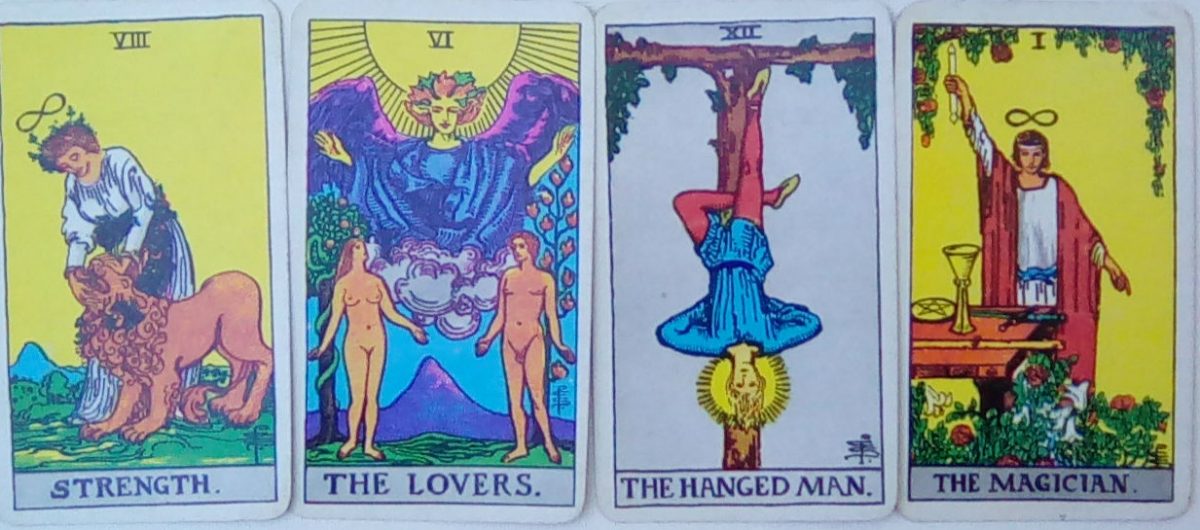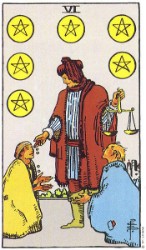
The Five of Cups shows a person who is in deep grief. He’s lost something vital in his life and he’s mourning it on the deepest, most profound level. In the system of the Tarot, Cups represent emotions and he sees three of his cups lying on the ground, tipped over, and spilling out their emotions. He’s literally hypnotized and immobilized by his sadness.
A sub-theme of this card is that he is also NOT focusing on the two remaining cups, which are upright and full. He is so concentrated on what he’s lost that he’s not perceiving that he still has something left to be grateful for.
Happiness is one of those things in life that we seldom contemplate until we lose it. Most humans are born happy. Sure, there are the inevitable times when babies get, “fussy,” or decide to stay awake screaming their little heads off all night, but most young critters are happy, playful and content. It doesn’t matter if we’re talking about human babies, puppies, kittens, or deer, the young are pretty much happy, pretty much most of the time.
So in many ways, happiness is a birthright of most living beings. It’s also frequently a matter of inertia – objects in motion tend to stay in motion and happy people tend to stay happy. We don’t even think about it until it disappears – we’re just pretty much happy, pretty much most of the time. In the words of the old blues song, “You don’t miss your water ‘til your well runs dry.”
We’re told that into each life a little shit must fall, and, sure enough, we all suffer a certain amount of loss and grief. We all have loved ones who die or become very ill, we get fired from jobs, we go through separations and divorces, and we occasionally get into car wrecks or fall down and break something that we’d rather not have broken.
Thankfully, for most of us, those losses come in fairly measured doses and we have enough support built into our lives to recover and return to our natural state of happiness. But there are also those of us who get absolutely hammered by loss and grief. Who don’t just experience the death of loved ones, but the tragic death of loved ones. Who don’t just go through a divorce but go through a devastating divorce, lose their homes, lose their jobs, and find themselves out on the street with nothing but the lint in the pockets of their overcoats. Who not only lose their happiness, but lose it for a LONG time.
Oddly, those are the people who probably appreciate happiness the most, because they’re the people who were forced to live without it. They’re the people who had to fight to regain it, often alone, frightened, and hopeless. To my mind, they’re some of the real heroes in life, the spiritual warriors who made it back from the dark side, from the brink of madness and suicide.
If you’ve ever gone through that kind of a loss, you’ll know what I mean. If you’ve suffered a major nervous breakdown, or battled with alcoholism and addiction, or lived with crippling depression, you know what it’s like to be so down that you can’t even see up anymore. Life becomes a meaningless, seemingly endless, series of days and nights filled with darkness, sadness, and extreme anxiety. You don’t really know why you go on living, but you do, putting one foot in front of the other and slogging along toward nothing.
Now, some of us don’t make it back from that journey into darkness. Some of us get swept over the precipice into oblivion. Suicide is the 12th leading cause of death in the United States. In 2020 there were 1.2 million suicide attempts in the country and nearly 46,000 successful suicides. Those are, of course, only the suicides we know about because many of them are concealed.
For those of us who do make it back, happiness becomes a desperate quest and a practice. We realize at some point that if we’re going to stay alive we somehow have to find a way to recapture happiness and build it back into our lives. For some of us, that means finding a really good therapist to help us unravel all of the emotional knots and heal the psychic wounds. For others, the gateway to happiness is the doorway to an Alcoholics Anonymous meeting hall. Perhaps happiness arrives in the form of a prescription for Prozac or a spiritual reawakening or even a psilocybin mushroom.
Happiness doesn’t arrive all at once, neatly bound in wrapping paper and ribbons. It’s something that we carefully build back into our lives, one trembling step at a time. We may need to learn how to control our thoughts that obsessively lead us back to melancholy view points. We may need to learn how to control our emotions and just do some deep belly breathing and meditation when we feel overwhelmed with sadness. We may need to sit down with a therapist and do some serious exploration of why our paths crumbled under our feet.
Happiness at that point is transformed from a natural occurrence into a set of skills that we practice in our daily lives.
For me, one of the major breakthroughs was my therapist teaching me that we can be happy whenever we want to be. We can sit down, meditate on something that makes us happy, and we will feel happy, even if just for a few moments. If we string together enough of those meditations, we have a happy day. If we string together enough of those days, we have a happy life. It’s a skill. It’s a practice.
The other day I was listening to this delightful video from author Mary Pipher about her book, “Women Rowing North.”
The book is primarily about women and about aging, but it also has a lot of good information on happiness. One of the things she said that really jumped out at me is that happiness is an existential choice.
There’s a deeply profound lesson in there because happiness can’t be a choice until we’ve lost it and then we’ve finally learned how to regain it.
When happiness is just our natural state of being, we’re on spiritual cruise control. When we’re pretty much happy, pretty much most of the time, like puppies and kittens and babies, we’re not choosing happiness – we just ARE happy. And happiness is frequently perceived as something that’s outside of us, that happens to us, rather than something we create. We meet the right partner, we stumble into a good job, we have a nice summer, we get laid, we see a funny movie. It’s all a sort of a pleasant parade of sweet events that we have absolutely no control over.
When we lose our happiness – really and truly lose it for an extended period of time – and we learn how to recreate it in our lives, then it becomes something that we can control. It becomes a product of practicing certain skill sets like meditating, staying in positive thinking, avoiding negative situations and people, and performing all of the little mental and emotional hygiene tasks that are required to stay in a state of happiness. We’re trying to stay in a state of happiness because we KNOW that we’ll die if we don’t.
There’s a step beyond that, though, which is what Mary Pipher is talking about. When we practice happiness long enough, there comes a wonderful day when we realize that we CHOOSE to be happy. At that point, happiness isn’t just a survival mechanism, it isn’t just a way to avoid the darkness. It’s an active, conscious embrace of the Light. Happiness isn’t just a way to get along, it becomes our primary value and our choice and we know that we’ll never live without it again.
It’s a huge gift in life. We only find it at the end of some very dark paths, but when we reach that point we realize that the journey has been a magical quest that led us to our own inner light.




